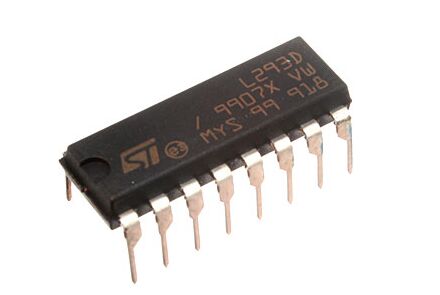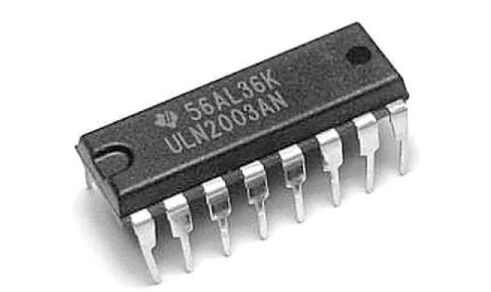一、Introduction to L293D
The L293D is a popular and versatile quadruple high-current half-H driver IC (Integrated Circuit) used to control the direction and speed of DC motors and stepper motors. It is widely utilized in robotics, automation, and various other applications where motor control is essential. Here is an overview of the L293D IC:

Introduction to L293D:
Functionality:
-
Motor Driver: The L293D acts as a motor driver, allowing bidirectional control of two DC motors or one stepper motor.
-
H-Bridge Configuration: It features H-bridge circuits for each motor channel, enabling control of motor direction by toggling the input signals.
Features:
-
High Current Handling: Capable of driving up to 600mA continuous current per channel and can peak up to 1.2A.
-
Built-in Diodes: Integrated kickback diodes provide protection against back EMF (electromotive force) generated by the motors.
-
Logical Control: Designed to be interfaced with microcontrollers or other logic circuits to control motor operations.
-
DataSheet L293D PDF
Pin Configuration:
-
16-Pin IC: The L293D usually comes in a 16-pin dual in-line package (DIP) or surface-mount (SMD) form factor.
-
Control Inputs: Each motor's direction and enable pins can be controlled independently, allowing forward, reverse, braking, or coasting operations.
Applications:
-
Robotics: Driving robot wheels or actuators.
-
Automation: Conveyor belt control, gate opening/closing systems.
-
DIY Electronics: Controlling motorized projects like small vehicles or automated devices.
Working Principle:
-
Input Signal Control: Signals from a microcontroller or logic circuit determine motor direction and speed.
-
H-Bridge Functionality: The H-bridge configuration allows the motor to run forwards or backwards based on the input signal.
-
Enable Pins: Enable signals activate or deactivate motor operation, essential for safety and power management.
Benefits:
-
Simplified Motor Control: Enables easy interfacing between motors and control circuits.
-
Low Cost: A cost-effective solution for basic motor control applications.
-
Versatile: Supports various motor types and configurations, making it a versatile choice for many projects.
The L293D motor driver IC is a fundamental component in many motor control applications, providing a simple yet effective way to control the movement of DC motors and stepper motors. Its ease of use, affordability, and versatility make it a popular choice for hobbyists, students, and professionals working on projects that involve motor control.
二、Introduction to ULN2003

The ULN2003 is a popular high-voltage and high-current Darlington array IC (Integrated Circuit) commonly used for driving inductive loads such as relays, solenoids, stepper motors, and other high-power peripherals. This IC is widely employed in various applications where robust and efficient control of such loads is required. Here is an introduction to the ULN2003 IC:
Introduction to ULN2003:
Functionality:
-
Darlington Array: The ULN2003 contains seven Darlington transistor pairs, providing high-current amplification for driving inductive loads.
-
Switching and Amplification: It offers a convenient way to switch high-power loads with minimal input current and can handle significant voltage and current levels.
-
DataSheet ULN2003A PDF
Features:
-
High Voltage Handling: Capable of driving loads with voltages up to 50V.
-
High Current Capacity: Each Darlington pair can handle current up to 500mA and collectively, the IC supports up to 2.5A per package.
-
Built-in Flyback Diodes: Integrated freewheeling diodes provide protection against voltage spikes generated by inductive loads, enhancing reliability.
Pin Configuration:
-
16-Pin IC: The ULN2003 typically comes in a 16-pin dual in-line package (DIP) or surface-mount (SMD) package.
-
Seven Darlington Pairs: Each pair consists of a high-voltage/high-current Darlington transistor for efficient load driving.
Applications:
-
Relay Driving: Controlling electromechanical relays in various applications.
-
Stepper Motor Control: Providing current amplification for stepper motor windings.
-
Solenoid Control: Driving solenoids in industrial and automation systems.
Working Principle:
-
Input Logic: The ULN2003 input pins receive control signals to activate the corresponding Darlington transistor pairs.
-
Current Amplification: The Darlington pairs amplify the input current to drive high-power loads efficiently.
-
Inductive Load Protection: Integrated flyback diodes protect the IC and external circuitry from voltage spikes induced by inductive loads.
Benefits:
-
Efficient Load Driving: Offers high-current amplification for inductive loads without significant power loss.
-
Simplified Circuit Design: Streamlines the design process by providing a ready-to-use solution for driving high-power peripherals.
-
Reliability: Built-in diode protection enhances the reliability and lifespan of the connected components.
The ULN2003 Darlington array IC is a valuable component in applications requiring robust and efficient driving of high-power inductive loads. Its ability to control multiple loads with ease, along with its high current and voltage capabilities, makes it a go-to choice for projects involving relay, stepper motor, and solenoid control. Whether in hobbyist projects or industrial applications, the ULN2003 offers a reliable and cost-effective solution for driving inductive loads with precision and efficiency.
三、Pin configuration of L293D and ULN2003
The L293D and ULN2003 are two commonly used ICs in electronics for motor and load driving applications. Here are the pin configurations for both the L293D and the ULN2003:
L293D Pin Configuration:
The L293D is a motor driver IC that consists of H-bridge circuits capable of driving DC motors bidirectionally. Here is the typical pin configuration for the L293D in a 16-pin DIP package:
L293D 16-Pin DIP Package Pinout:
- Vcc1: Motor Voltage Supply
- EN2: Enable Pin for Motor 2
- Input 1, 2, 3, 4: Control Inputs for Motor Direction
- Output 1A, 1B, 2A, 2B, 3A, 3B, 4A, 4B: Motor Outputs
ULN2003 Pin Configuration:
The ULN2003 is a high-voltage, high-current Darlington transistor array IC commonly used for driving inductive loads. Below is the typical pin configuration for the ULN2003 in an 16-pin DIP package:
ULN2003 16-Pin DIP Package Pinout:
- COM: Common Pin
- Input 1 - Input 7: Input Control Pins
- Output 1 - Output 8: Output Pins for Driving Loads
These pin configurations outline how the pins are typically arranged on the IC packages. When using these ICs in your circuit designs, refer to the datasheets for precise information on pin functions, electrical characteristics, and recommended usage guidelines.
四、Absolute Maximum Ratings of L293D and ULN2003
•L293D

•ULN2003

五、Application fields of L293D and ULN2003
Both the L293D and ULN2003 ICs are commonly used in electronics for driving various loads such as motors, relays, solenoids, and more. Here are the application fields where each IC finds frequent use:
Application Fields of L293D:
-
Robotics:
- DC Motor Control: L293D is widely used to control the direction and speed of DC motors in robotic applications such as robot arms, wheeled robots, and drones.
-
Automation Systems:
- Industrial Automation: It is used in conveyor belt systems, automated packaging machinery, and other industrial applications for motor control.
-
Electronics Projects:
- DIY Electronics: Hobbyists and makers utilize the L293D in various projects like smart vehicles, automated blinds, and small automation setups.
-
Education:
- Embedded Systems Learning: L293D is commonly used in educational settings to teach students about motor control and basic electronics concepts.
-
IoT Devices:
- Home Automation: It can be integrated into IoT devices for controlling motors in smart home applications like motorized curtains or window blinds.
Application Fields of ULN2003:
-
Relay and Solenoid Control:
- Electronic Switching: ULN2003 is often used to drive relays and solenoids in applications such as industrial control systems and home automation.
-
Stepper Motor Control:
- Precision Movements: It's commonly employed to drive stepper motors in devices requiring precise and controlled movements, like 3D printers, CNC machines, and robotic arms.
-
Automotive Electronics:
- Automotive Systems: ULN2003 is found in automotive applications for controlling various electromechanical components like automotive door locks and window actuators.
-
Telecommunications:
- Switching Systems: Used in telecommunications equipment for managing circuits, switches, and other components that require high-current drive capabilities.
-
Medical Devices:
- Equipment Control: The ULN2003 is used in medical equipment for controlling various components that involve high-current loads, such as pumps and actuators.
Common Applications of Both ICs:
-
IoT and Home Automation:
- Both ICs are suitable for motor control in IoT devices, smart home systems, and automated appliances.
-
Educational Projects:
- These ICs are often used in educational projects to demonstrate basic motor control principles and electronics concepts.
-
Industrial Automation:
- They find applications in industrial automation systems for controlling various motorized components.
-
Consumer Electronics:
- Used in a range of consumer electronics products requiring motor control, like toys, small appliances, and gadgetry.
By understanding the application fields of the L293D and ULN2003 ICs, engineers, hobbyists, and designers can effectively utilize these components in a wide range of projects across different industries and applications.
六、The difference between L293D and ULN2003
The L293D and ULN2003 are both popular integrated circuits used in electronics for driving various loads, but they serve different purposes and have distinct characteristics. Here are some key differences between the L293D and ULN2003 ICs:
L293D:
- Functionality:
- Motor Driver: The L293D is primarily used for driving DC motors, stepper motors, and other types of motors bidirectionally.
- H-Bridge Configuration:
- Bidirectional Control: It features an H-bridge configuration that allows for controlling motor direction by toggling the input signals.
- Current Handling:
- Current Capacity: The L293D can handle up to 600mA continuous current per channel and can peak up to 1.2A.
- Applications:
- Motor Control: Commonly used in robotics, automation systems, small vehicles, and other projects that involve motor control.
ULN2003:
- Functionality:
- Darlington Array: The ULN2003 is designed for high-voltage and high-current applications, particularly for driving inductive loads like relays, solenoids, and stepper motors.
- Amplification:
- Current Amplification: It consists of Darlington transistor pairs for amplifying current and driving loads efficiently.
- Current Handling:
- Current Capacity: Each Darlington pair in the ULN2003 can handle currents up to 500mA, collectively supporting up to 2.5A per package.
- Applications:
- Inductive Load Control: Widely used in applications where driving high-power inductive loads with protection against back EMF is necessary, such as relay control and stepper motor control.
Key Differences:
- Load Types:
- The L293D is primarily focused on motor control applications, while the ULN2003 is more suited for inductive load driving such as relays and solenoids.
- Output Configuration:
- The L293D outputs are designed for motor control with bidirectional functions, while the ULN2003 features Darlington transistor pairs for high-current amplification.
- Current Handling:
- The ULN2003 typically has higher current-handling capabilities compared to the L293D, making it suitable for driving heavier loads.
- Protection Features:
- The ULN2003 often includes integrated protection features like freewheeling diodes for handling back EMF from inductive loads, which the L293D may not have.
In summary, while both the L293D and ULN2003 are essential components for driving loads in electronics, they are optimized for different types of applications. The L293D excels in motor control scenarios, whereas the ULN2003 is better suited for driving high-power inductive loads, making them valuable in distinct electronic systems and projects.
七、Common points between L293D and ULN2003
While the L293D and ULN2003 are distinct ICs designed for different purposes, they do share some common characteristics and usage scenarios:
Common Points between L293D and ULN2003:
-
Load Driving:
- Both ICs are designed to drive loads, with the L293D commonly used for controlling motors (DC motors, stepper motors) and the ULN2003 for driving inductive loads like relays and solenoids.
-
High Current Capabilities:
- While their current-handling capacities differ, both ICs are capable of handling relatively high current levels suitable for driving motors and other high-power loads.
-
Driver Functionality:
- They both act as driver ICs, providing amplification and control to interface with external loads while protecting the control circuitry.
-
Integrated Components:
- Both ICs often include integrated protection features such as diodes for back EMF suppression (L293D) and clamp diodes for inductive load protection (ULN2003), enhancing their robustness in real-world applications.
-
Hobbyist and Educational Use:
- Both ICs are popular choices for hobbyist projects and educational purposes due to their ease of use, versatility, and common applications in introductory electronics and robotics projects.
-
Versatile Applications:
- While their primary functions differ, both ICs find applications in a broad range of projects across industries such as robotics, automation, IoT devices, consumer electronics, and more.
-
Availability:
- Both the L293D and ULN2003 are widely available, cost-effective ICs that are easy to integrate into circuits, making them popular choices for various load-driving applications.
Conclusion:
While the L293D and ULN2003 serve different roles in electronics projects—motor driving and inductive load driving respectively—their high-current capabilities, integrated protection features, versatility, and ease of use make them valuable components in a wide range of applications. Designers and hobbyists often leverage these ICs to drive various loads efficiently and reliably, benefiting from their shared characteristics and functionality in different contexts within the realm of electronics and embedded systems.
Frequently Asked Questions
1.Does L293D have built-in current protection?
L293D does not provide built-in current protection function. It is mainly a dual H-bridge driver used to control the forward, reverse and speed of DC motors, but does not include a dedicated current protection circuit in the design.
2.What are the advantages of L293D?
It is simple and easy to use, suitable for low-power motors, dual H-bridge design, built-in diodes, and suitable for low-voltage applications.
3.How many channels does ULN2003 have?
ULN2003 consists of seven NPN Darlington pairs, making it capable of driving up to seven separate loads.
4.How to use ULN2003 with Arduino?
The driver board has two pins labeled GND and VCC, which are the two power supply pins. The GND pin of the ULN2003 driver board must be connected to the GND pin of the Arduino. Likewise, the driver board's VCC pin should be connected to the Arduino's 5V pin.



